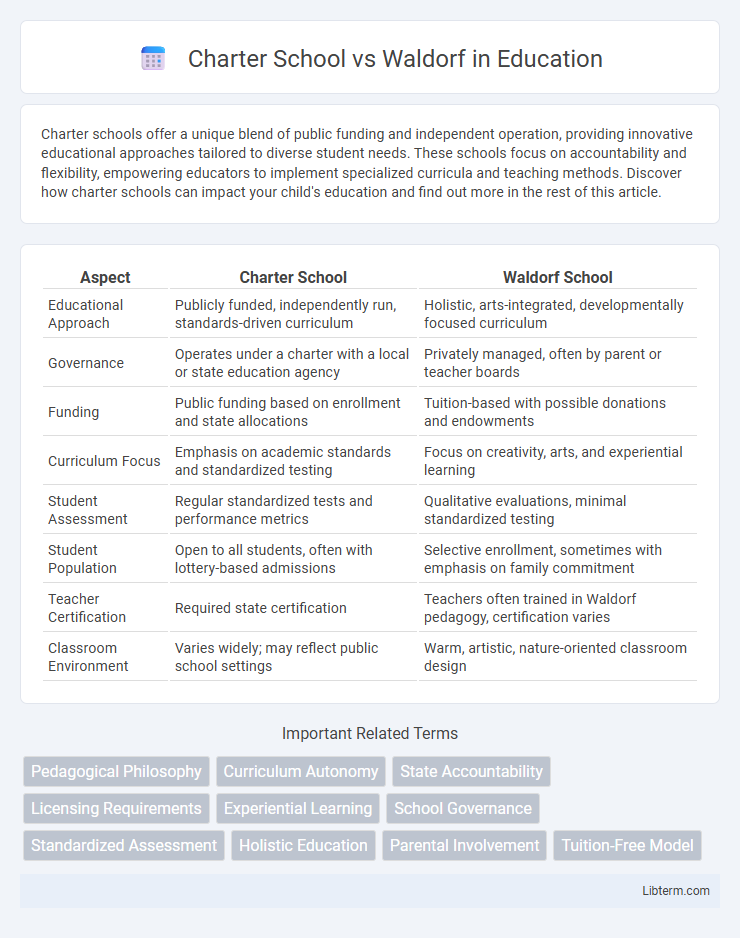Charter schools offer a unique blend of public funding and independent operation, providing innovative educational approaches tailored to diverse student needs. These schools focus on accountability and flexibility, empowering educators to implement specialized curricula and teaching methods. Discover how charter schools can impact your child's education and find out more in the rest of this article.
Table of Comparison
| Aspect | Charter School | Waldorf School |
|---|---|---|
| Educational Approach | Publicly funded, independently run, standards-driven curriculum | Holistic, arts-integrated, developmentally focused curriculum |
| Governance | Operates under a charter with a local or state education agency | Privately managed, often by parent or teacher boards |
| Funding | Public funding based on enrollment and state allocations | Tuition-based with possible donations and endowments |
| Curriculum Focus | Emphasis on academic standards and standardized testing | Focus on creativity, arts, and experiential learning |
| Student Assessment | Regular standardized tests and performance metrics | Qualitative evaluations, minimal standardized testing |
| Student Population | Open to all students, often with lottery-based admissions | Selective enrollment, sometimes with emphasis on family commitment |
| Teacher Certification | Required state certification | Teachers often trained in Waldorf pedagogy, certification varies |
| Classroom Environment | Varies widely; may reflect public school settings | Warm, artistic, nature-oriented classroom design |
Introduction to Charter Schools and Waldorf Education
Charter schools are publicly funded institutions operating independently of traditional school districts, offering innovative curricula tailored to meet diverse student needs while emphasizing accountability and parental choice. Waldorf education, founded by Rudolf Steiner, prioritizes holistic development through a curriculum integrating artistic, practical, and intellectual elements, fostering creativity and social responsibility. Both educational models present unique approaches, with charter schools emphasizing flexibility and standardized performance metrics, while Waldorf schools focus on developmental stages and experiential learning.
Philosophical Foundations: Charter vs. Waldorf
Charter schools emphasize a results-driven, standards-based education model focused on academic achievement and innovation within public accountability frameworks. Waldorf schools follow a holistic philosophy rooted in anthroposophy, prioritizing creativity, artistic expression, and developmental stages tailored to nurture the whole child. The fundamental divergence lies in charter schools' adherence to measurable outcomes versus Waldorf's emphasis on experiential, individualized learning aligned with spiritual and developmental principles.
Curriculum Differences: Standardization vs. Creativity
Charter schools emphasize standardized curricula aligned with state testing requirements, ensuring measurable academic outcomes and consistent benchmarks across classrooms. Waldorf schools prioritize creativity and holistic development, using an arts-integrated, experiential curriculum that adapts to individual student rhythms and developmental stages. The contrasting focus highlights charter schools' data-driven approach versus Waldorf's emphasis on imaginative, child-centered learning.
Teaching Methods: Structured vs. Holistic Approaches
Charter schools emphasize structured teaching methods focused on standardized curricula, data-driven assessments, and skill mastery, ensuring measurable academic outcomes. Waldorf schools adopt holistic approaches that integrate arts, creativity, and experiential learning, fostering emotional and social development alongside intellectual growth. This contrast highlights the Charter model's emphasis on academic rigor versus Waldorf's dedication to nurturing the whole child through interdisciplinary, developmental practices.
Student Assessment and Evaluation Practices
Charter schools emphasize standardized testing and data-driven assessments to measure student performance and ensure accountability, often aligning with state and federal benchmarks. Waldorf schools adopt holistic evaluation methods, including qualitative observations, narrative assessments, and portfolio reviews, focusing on individual student growth and creativity rather than standardized scores. This contrast reflects the charter model's priority on quantifiable outcomes versus Waldorf's emphasis on developmental progress and intrinsic motivation.
Teacher Qualifications and Training Requirements
Charter schools typically require teachers to hold state certification and meet specific credentialing standards, ensuring alignment with public education regulations. Waldorf schools emphasize specialized training in Waldorf pedagogy, often necessitating completion of dedicated Waldorf teacher education programs focused on developmental stages and artistic teaching methods. The contrast in qualifications highlights charter schools' focus on standardized credentials versus Waldorf schools' commitment to holistic, experiential training.
Parental Involvement and Community Engagement
Charter schools often emphasize structured parental involvement through organized activities, regular communication, and volunteer programs that actively integrate families into academic decision-making and school events. Waldorf schools foster community engagement by encouraging parents to participate in artistic projects, seasonal festivals, and classroom collaborations, promoting a holistic and immersive educational experience. Both models value parental contribution, but charter schools prioritize measurable involvement metrics while Waldorf schools focus on sustained cultural and creative community connections.
Cost, Funding, and Accessibility Comparison
Charter schools typically receive public funding and operate tuition-free, making them more accessible to a diverse student population compared to Waldorf schools, which usually rely on private tuition and donations, resulting in higher costs for families. Funding sources for charter schools include state and federal grants, enabling them to offer specialized programs without direct financial burden on students, while Waldorf schools often have limited access to public funds and depend heavily on family contributions and fundraising efforts. Accessibility is higher in charter schools due to their public status and mandated open enrollment policies, whereas Waldorf schools may have selective admission and fewer locations, restricting access for many families.
Academic Outcomes and Student Success Rates
Charter schools often emphasize standardized test performance and college readiness, showing higher proficiency rates in math and reading compared to traditional public schools. Waldorf schools prioritize holistic development, creativity, and critical thinking, which may lead to lower standardized test scores but strong long-term success in problem-solving and social skills. Academic outcomes in charter schools tend to be quantifiable through metrics like graduation rates and college enrollment, while Waldorf schools measure success through developmental milestones and student engagement.
Choosing the Right Fit: Key Considerations for Parents
Parents choosing between charter schools and Waldorf education should evaluate curriculum focus, teaching methodology, and student engagement strategies to ensure alignment with their child's learning style. Charter schools often emphasize standardized testing and college readiness, while Waldorf education prioritizes creativity, imagination, and holistic development. Considering factors like class size, community involvement, and long-term educational goals helps parents select the ideal environment for their child's academic and personal growth.
Charter School Infographic

 libterm.com
libterm.com